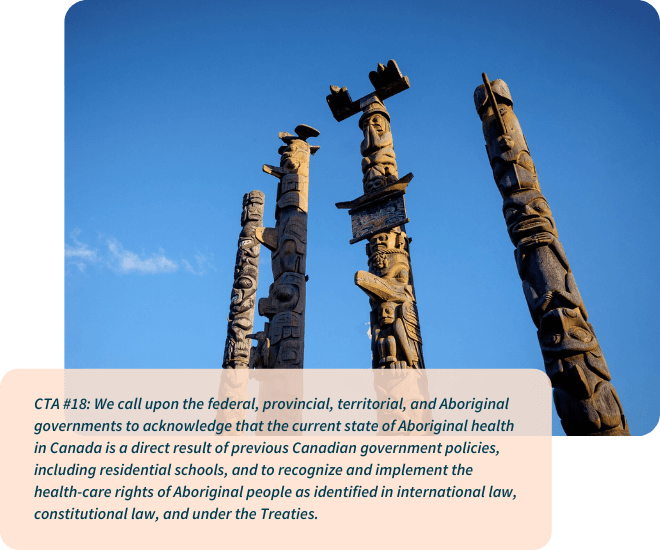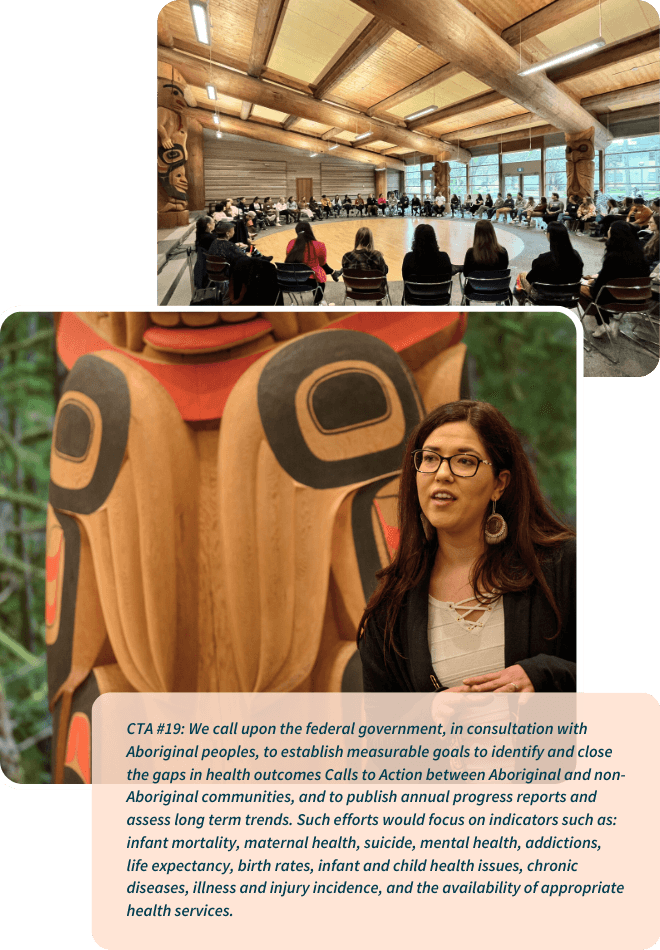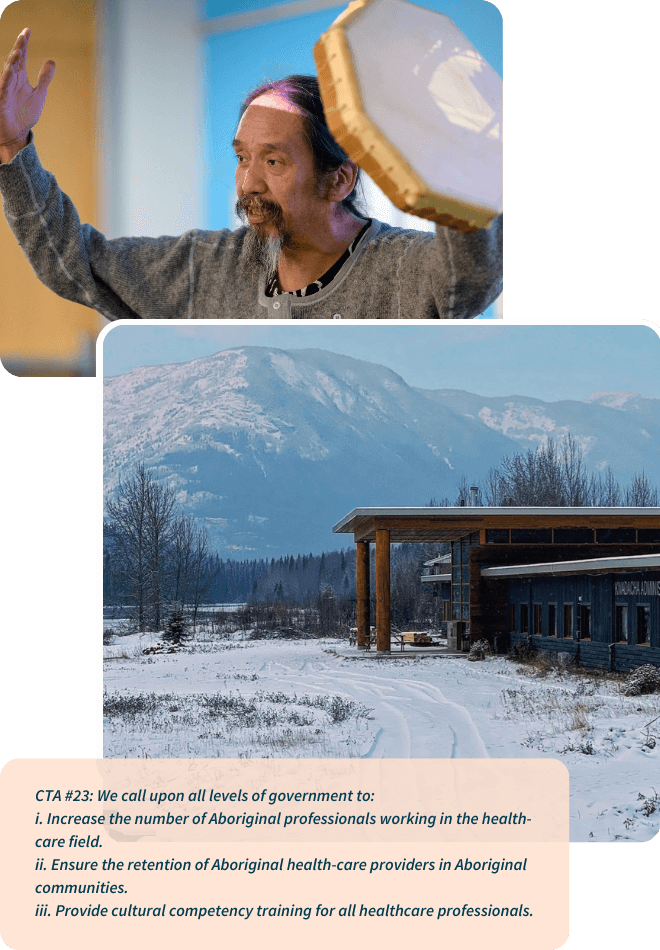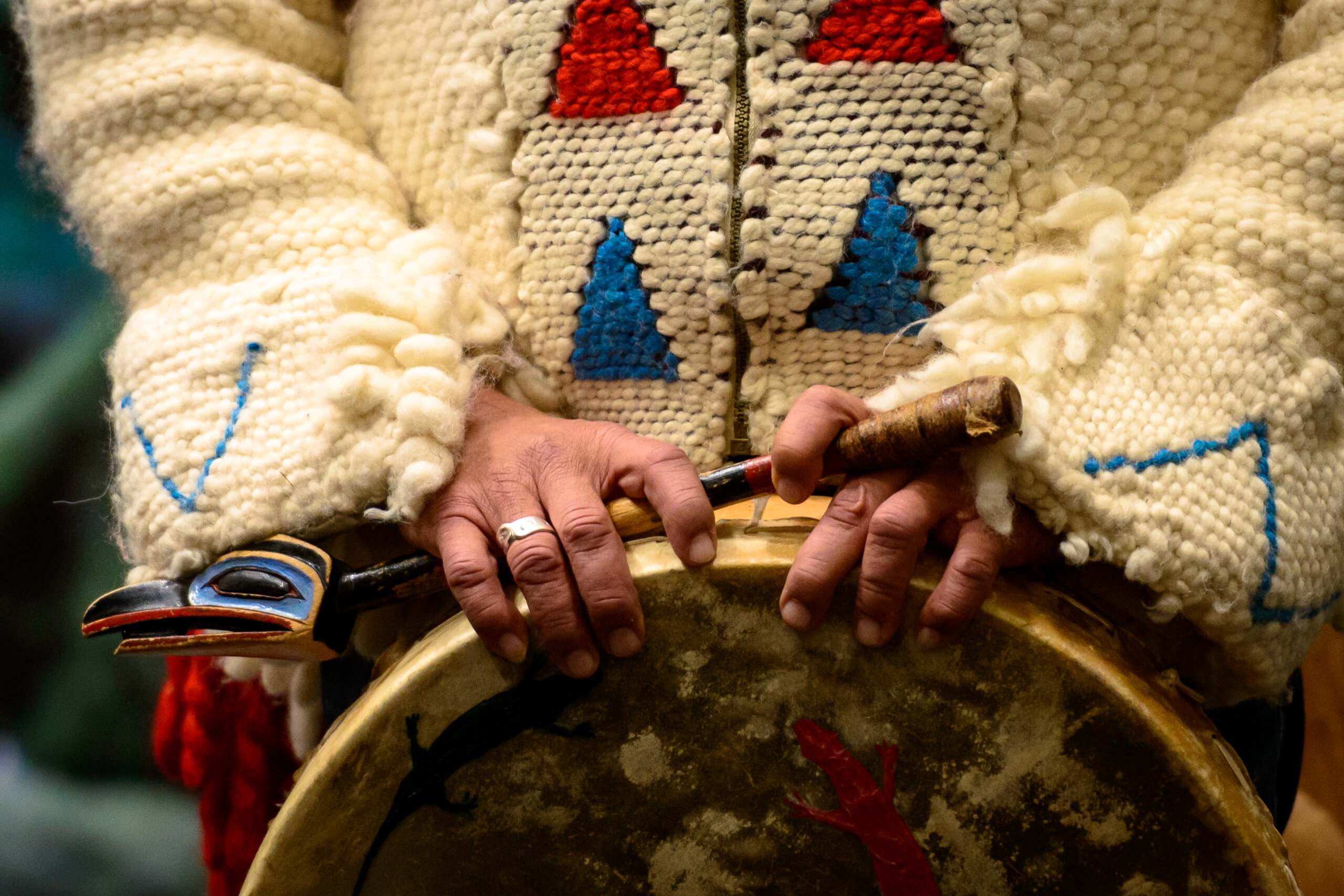In 2023 our network has worked collaboratively with Indigenous communities, Elders, Knowledge Keepers and consultants to address some of the calls to action (CTAs) contained within the Truth and Reconciliation Commission of Canada report. With team members across the province, we are well positioned to make a difference by building capacity in rural, remote and Indigenous communities in order to close health equity gaps.
While we recognize that we still have much work to do, this report highlights how the Rural Coordination Centre of BC has sought to address truth and reconciliation in healthcare this past year.
Call to Action #18
The Rural Coordination Centre of BC acknowledges that the current state of our healthcare system does not serve the Indigenous population in BC well and is the direct result of previous Canadian government policies, including colonial structures like residential schools. We understand that, before we can work towards reconciliation, we must prioritize truth—and seek cultural safety and humility to understand our own biases.
As part of this journey, the Rural Site Visits Project reports to the JSC on the current state of healthcare in Indigenous communities we visit. As part of this work, we relay stories of how patients were treated in emergency departments and clinics and how communities’ health experiences are affected by generational trauma, including addiction and suicide. We are also intentional about ensuring that staff have access to cultural safety training, including access to the Sany’as course, and paid time to complete it.
RCCbc also supports the Atleo Centre for Compassionate Leadership training program led by Shawn and Heather Atleo, ‘Ya’akstulth: Leading with Compassion in a Tumultuous Era’. Weaving together Indigenous and Western pedagogy, this program is grounded in the concept of relationality and invites participants to explore what Team Atleo believes is the essence of leadership, rooted deeply within each of us.

35 San’yas Indigenous Cultural Safety Participants
In 2023 14 RCCbc staff members completed the San’yas Indigenous Cultural Safety course, bringing the total number of staff trainees to 35.
Call to Action #19
RCCbc is committed to closing health equity gaps in all the work we undertake.
Our RISE (RCCbc on Inclusion, Social Justice, and Equity) Reference Group encourages and invites collaboration with internal and external network groups within RCCbc. It also develops and encourages the use of tools, such as the Conceptual Lens and Evaluation Matrix, to support our network and projects in elevating Indigenous health equity and measuring goals.
The Real-Time Virtual Support (RTVS) peer pathway program, administered by RCCbc, provides healthcare workers in rural, remote, and Indigenous communities with clinical support to deliver quality, culturally safe healthcare services to patients. The project monitors which, and how often, communities use its pathways, the reason for the consult (e.g. abdominal pain or mental health issue, etc.) and collects feedback about cultural safety from pathway callers to improve services.
The Rural Health Services Research Network of BC (RHSRNbc) have included three Indigenous partners that make up our Indigenous Advisory Committee in our CCEDARR grant application incubated in the RHSRNbc. In the proposal development stage and through to data collection, our group commits to the OCAP principles in health research: ownership, control, access, and possession. Our Indigenous partners are leading the research in Indigenous communities to ensure that research engagement includes the requirement of equitable benefit for First Nations, Métis and Inuit people in Canada as evaluated by representative organizations.
The Sustaining Pediatrics in Rural and Underserved communities (SPRUCe) initiative has formed an initial connection with the UBC Department of Pediatrics Health Justice and Equity Leads, and we hope to foster this relationship through the upcoming year (2024). Initial discussions focused on how to ensure that the provision of care to pediatric patients in BC aligns with the needs and desires of Indigenous people living in rural and remote communities. We feel that SPRUCe can play a role in evaluating this question and in working towards improving the experiences of Indigenous individuals in BC’s health care system.
Family Physicians with Enhanced and Obstetrical Surgical Skills (FP-ESS/OSS) allow rural communities to maintain maternity services, as well as improve access to appropriate procedural care. Through supporting FP-ESS/OSS physicians, rural services are maintained, enabling more people to deliver closer to home and in their traditional territories. Through ongoing virtual rounds, we hope to explore ways that local maternity programs can assess and address gaps in maternity care for Indigenous patients.
The Point of Care Ultrasound (POCUS) project recognizes that all communities deserve high quality, close to home care, regardless of where you reside in BC. Through education in community, rounds, virtual support and one-on one coaching, the project seeks to serve our most remote and underserviced communities many of which are Indigenous. POCUS allows for the provision of quicker, more accurate, diagnoses in remote communities than is occurring in urban family physician offices, reversing the inequity Indigenous communities have experienced for many years.

Call to Action #20
The RCCbc wholeheartedly supports programs that are addressing this challenge. The RTVS peer program includes a close partnership with the First Nations Health Authority, which operates the First Nations Doctor of the Day (FNDoD) pathway—part of the RTVS suite of services. Virtual physicians with FNDoD will provide patient care to any Indigenous person in BC, and their family members, regardless of where they live in BC.
Virtual physicians on the peer pathways that are administered by RCCbc collaborate with the virtual physicians at FNHA to help patients and community providers navigate the health system.

Call to Action #22
Many projects administered by the Rural Coordination Centre of BC are benefiting from Indigenous ingenuity and knowledge.
An ongoing goal for SPRUCe is the plan to provide an accredited CME session for rural pediatricians on the topic of Indigenous healing practices. The support of RCCbc, with funds for speakers delivering CME-accredited learning sessions, will help us to accomplish this goal. Ensuring there is adequate compensation for preparation and lecture time is essential when asking Indigenous partners to share their expertise and knowledge to support the cultural humility journey of non-Indigenous health care professionals.
The Provincial SPIFI (Specialist, Sub-specialty, Indigenous and Funding for Innovation) Committee encourages rural physicians and provides funding and resources to engage Indigenous communities to learn and heal the relationship with healthcare providers, as needed.
UBC Rural CPD’s Indigenous Patient-Led program has been delivering a three-level longitudinal curriculum, Nawh Whu’nus’en – We See in Two Worlds: Trauma Sensitive Practices for Collectively Healing in Relationship. Developed and delivered by a team of Indigenous and non-Indigenous Elders, physicians, educators, and people with lived experience, they offer this training to rural medical providers to help create conditions that might enable culturally safer care when working with Indigenous patients. The Rural Site Visits Project employs a Two-Eyed Seeing approach which values Indigenous ways of knowing, being, thinking in our Site Visits engagement process. We invite Elders, traditional healers, and knowledge holders as they are important partners in our health partners meetings.

Call to Action #23
RCCbc continues to work towards building and improving systems where Indigenous providers can thrive. We have also worked collaboratively within our own network and across various partnerships to provide cultural competency training in various settings.
In 2023, the communities of Creston and Fernie each held a CME-accredited Cultural Safety workshop through the Rural Continuing Medical Education (RCME) Community Fund Program. This workshop was a partnership with the East Kootenay Primary Care Network, Facility Engagement and RCME community program funds and was developed and facilitated by local physicians and the cultural educator from Ktunaxa Nation. The workshop included an introduction to cultural safety and humility and then took participants through a patient’s journey to illustrate frequent pain points experienced by Indigenous peoples when seeking healthcare. The session concluded with a Q&A panel of Ktunaxa representatives and guests, as well as a physician who provides care to the local band.
SPRUCe will always remain committed to supporting medical learners who identify as Indigenous in their training journey. SPRUCe’s collaboration with the UBC Pediatric Residency training program allows us to advocate on behalf of residents who identify as Indigenous and to connect these trainees with potential mentors.
Quality Team Coaching for Rural BC provides cultural competency training which typically comes forward when we talk about cultural safety, psychological safety, and the polyvagal theory, which all help to understand some of the impacts of colonization alongside offering some skills that support a sense of safety.
In offering Isolated Medical Provider After Care Team (IMPACT) peer supports to all provincial First Nations communities, including those in the Nisga’a. These support calls are also made to nurses in small communities where they are the MRP. These check-ins have been appreciated by staff, and we have also found (in support of the RTVS suite of services) that these isolated providers have found that immediate virtual support “a game changer” in difficult patient management and transport decisions.
The RTVS peer program increases access to culturally safe virtual clinical support for Indigenous healthcare providers and non-Indigenous healthcare providers working with Indigenous patients in rural and remote areas of BC. These providers report greater confidence in caring for patients in challenging situations as a result of having instant access to friendly, culturally safe virtual support.
RTVS peer pathways provide virtual physicians with cultural safety and humility learning opportunities that have been developed in collaboration and cooperation with Indigenous peoples to embed the provision of culturally safe care as a core skill and to encourage ongoing learning.
The Rural Site Visits Project have curated Cultural Safety resources to be shared with staff, participants, partners. We ask cultural safety and anti-Indigenous racism questions in our meetings that increase awareness and knowledge of successes and gaps in cultural safety training. Also doing ongoing learning as a team (sharing articles, books, workshops, webinars, etc.)

Call to Action #24
Through the work of pediatric resident, Dr. Sarah Fletcher, and her project “Evaluating the Experience of Residents and Pediatricians with Rural Pediatric Outreach Trips in BC” SPRUCe hopes to be support the development of a model for pediatric outreach (visiting specialist) clinics in rural communities which enables pediatric residents to gain exposure to the community and culture in which the clinics occur (rather than to only gain exposure to the clinical medical care which occurs through such clinics). This will require collaboration with the communities themselves, likely with support from RCCbc (RISE) and the Rural Site Visits Program.


